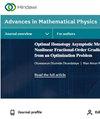Implicit Finite Difference Simulation of Hybrid Nanofluid along a Vertical Thin Cylinder with Sinusoidal Wall Heat Flux under the Effects of Magnetic Field
IF 1.1
4区 物理与天体物理
Q3 PHYSICS, MATHEMATICAL
引用次数: 0
Abstract
A numerical analysis of magnetohydrodynamic natural convection along a thin vertical cylinder with a sinusoidal heat flux at the wall immersed in copper (Cu) and aluminum-oxide (Al2O3) hybrid nanofluids has been studied. A 2D vertical thin cylinder shape geometry has been considered with a radius of R. The fluid flow is considered laminar and incompressible with the Prandtl number of Pr = 6.2 and 10% concentration of hybrid nanoparticles. The nondimensional governing equations have been solved numerically by using the implicit finite difference method. An in-house FORTRAN 90 code is used for solving this problem and the code is validated with the available benchmark results. Numerical simulations have been performed for a wide range of governing parameters, Hartmann number from Ha = 0 to Ha = 4, nanoparticles volume fractions ϕ = 0.0 to ϕ = 0.1, and the amplitude of the wall heat flux ε = 0.0–0.3. The findings have been illustrated in terms of streamlines, isotherms, local skin friction coefficients, local Nusselt numbers, velocity, and temperature distributions. The flow field and temperature distribution within the boundary layer are deceased by the effects of the wall heat flux amplitudes. It is also noted that the rate of heat transfer increases with particle volume fraction and the amplitude of the wall heat flux. According to the findings, Nu increases by 24.72% as ϕ increases from 0 to 0.1 while ε = 0.3, and 27.66% while ε increases from 0.0 to 0.3 at 5% hybrid nanoparticles. The local skin frictions and Nusselt number diminish with the increment of the Hartman number due to the effects of the Lorenz force. The findings of this study can lead to a better understanding of the fundamental principles regarding the behavior of hybrid nanofluids under complex conditions, such as a vertical thin cylinder with a sinusoidal wall heat flux. Understanding the behavior of hybrid nanofluids in the presence of a magnetic field and a nonuniform wall heat flow can also lead to the development of innovative heat transfer enhancement strategies.磁场效应下具有正弦壁面热通量的垂直薄圆柱混合纳米流体的隐式有限差分模拟
研究人员对浸入铜(Cu)和氧化铝(Al2O3)混合纳米流体的垂直薄圆柱体进行了磁流体力学自然对流的数值分析。研究考虑了半径为 R 的二维垂直薄圆柱体几何形状。流体流动为层流,不可压缩,普朗特数为 Pr = 6.2,混合纳米粒子浓度为 10%。采用隐式有限差分法对无量纲控制方程进行数值求解。内部使用的 FORTRAN 90 代码用于解决该问题,并用现有的基准结果对该代码进行了验证。数值模拟的调节参数范围很广,哈特曼数从 Ha = 0 到 Ha = 4,纳米颗粒体积分数 ϕ = 0.0 到 ϕ = 0.1,壁面热通量振幅 ε = 0.0-0.3 。研究结果通过流线、等温线、局部表皮摩擦系数、局部努塞尔特数、速度和温度分布进行了说明。边界层内的流场和温度分布受到壁面热通量振幅的影响。研究还发现,传热速率随颗粒体积分数和壁面热通量振幅的增加而增加。根据研究结果,当 ε = 0.3 时,ϕ 从 0 增加到 0.1,Nu 增加了 24.72%;当 ε 从 0.0 增加到 0.3 时,Nu 增加了 27.66%。由于洛伦兹力的影响,局部表皮摩擦和努塞尔特数随着哈特曼数的增大而减小。本研究的发现有助于更好地理解混合纳米流体在复杂条件下(如具有正弦壁面热通量的垂直薄圆柱体)的行为的基本原理。了解混合纳米流体在磁场和非均匀壁面热流作用下的行为还有助于开发创新的传热增强策略。
本文章由计算机程序翻译,如有差异,请以英文原文为准。
求助全文
约1分钟内获得全文
求助全文
来源期刊

Advances in Mathematical Physics
数学-应用数学
CiteScore
2.40
自引率
8.30%
发文量
151
审稿时长
>12 weeks
期刊介绍:
Advances in Mathematical Physics publishes papers that seek to understand mathematical basis of physical phenomena, and solve problems in physics via mathematical approaches. The journal welcomes submissions from mathematical physicists, theoretical physicists, and mathematicians alike.
As well as original research, Advances in Mathematical Physics also publishes focused review articles that examine the state of the art, identify emerging trends, and suggest future directions for developing fields.
 求助内容:
求助内容: 应助结果提醒方式:
应助结果提醒方式:


